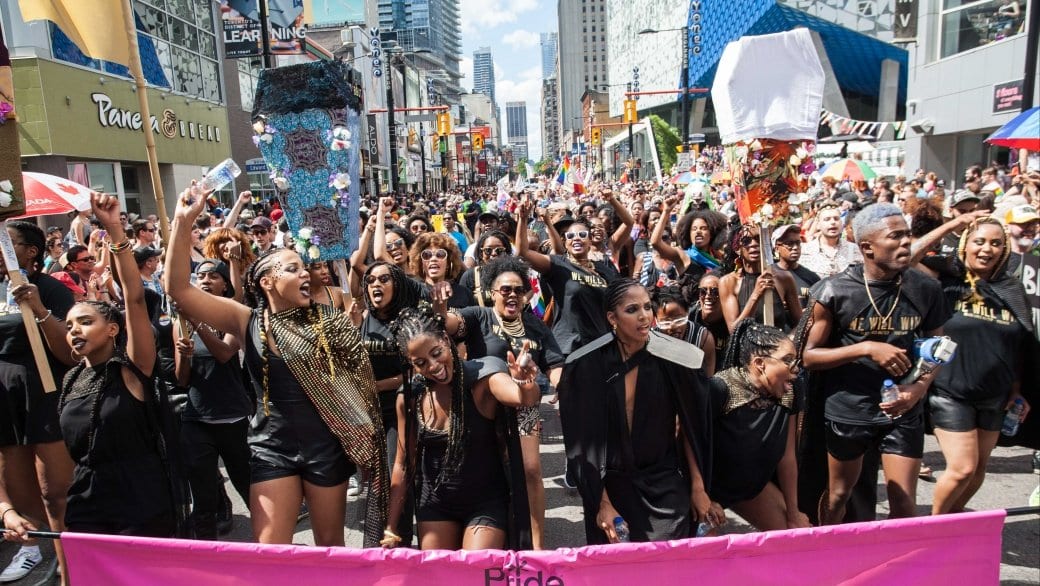When Black Lives Matter strategically stopped the Pride parade Sunday to stage their peaceful sit-in and present demands to Pride Toronto, I felt a twinge of hope.
Hope that we might see a return to Pride’s political roots.
Hope that this infusion of meaning and action might re-energize our sanitized and corporate parade.
Hope that BLMTO’s bold protest might spark new inspiration in community activism.
Of course I anticipated there would be controversy and criticism, but I still hoped it might open up sincere conversations within our community.
Now, I’m just angry.
I’m angry and dismayed at the tenor of so many of the responses flooding over social media and onto the opinion pages of this city’s newspapers.
BLMTO’s peaceful protesters have been cast as criminals, as bullies, as hijackers, as hostage takers, as racists and as homophobes. Equally troubling is the repeated framing of BLMTO as outsiders and ungrateful guests who had been welcomed into “our parade.”
Those critics who say that the BLMTO protest was an attack on LGBT people are really saying that they don’t see black people as part of the LGBT community.
Let’s be clear.
Black Lives Matter and its organizers are part of our community. Queer and trans black people are part of our community. Those aren’t and shouldn’t be controversial statements.
And when members of our community cry out and tell us that they feel unheard and that they have been marginalized, we should want to listen. This protest wasn’t an attack, it was a call for us and for our community to do better.
Yes, the sit-in was inconvenient and the parade was delayed for half an hour. But isn’t that the whole point of peacefully protesting, to make people sit up and take notice?
BLMTO was chosen as this year’s honoured group at Pride for a reason. Their activist mission is directly entwined with our LGBT communities and honours the historical roots of Pride and of our tradition of community resistance to discrimination. They have a message and Pride gave them a platform to deliver it.
As a community we should listen.
We should do more than listen. We should actively consider each of their demands. What is objectionable about envisioning a Pride that fully supports and honours community spaces?
What is objectionable about a Pride that fully funds and values stages to showcase and celebrate performers from all parts of our community — “that prioritizes Black, indigenous, and diverse spaces,” as BLMTO envisions?
Why can’t we carve out permanent space and stick to it — for stages like Blockorama, for example, whose organizers say they have to fight each year for funding and space on the street, and for the South Asian stage, which was missing from Pride this year?
Why shouldn’t we ask Pride to “take action and uphold their principles of diversity and equity?”
When you come down to it, eight of the nine demands boil down to respecting our communities and meaning it.
And then there’s the policing demand.
“We envision a Pride that is critical and acknowledges the tense/unsafe relationship between the Police and marginalized communities,” BLMTO says.
I think this is their most reasonable demand of all. It reflects the experiences of so many of the most marginalized members of our communities: the sex workers, the people of colour, the homeless queer youth, the trans people — everyone who has ever been targeted or faced unfair discrimination at the hands of the police.
It wasn’t that long ago that police routinely harassed many gays and lesbians, raided their spaces, unfairly scrutinized them on the streets, then ignored their complaints when they were attacked. Though some of us no longer face such blatant police harassment, many of us still do. And many of us have long memories that remain unswayed by police apologies.
I, for one, wouldn’t miss the police marching down Yonge Street in the Pride parade.
I don’t expect everyone to agree right now, but I do hope that we, as a community, will carefully consider the merits of each of BLMTO’s demands.
Their protest wasn’t an attack; it was a call for all of us to do better.
Matthew DiMera is the managing editor in Toronto of Xtra and can be reached at matthew.dimera@dailyxtra.com or on Twitter @mdimera.

 Why you can trust Xtra
Why you can trust Xtra


